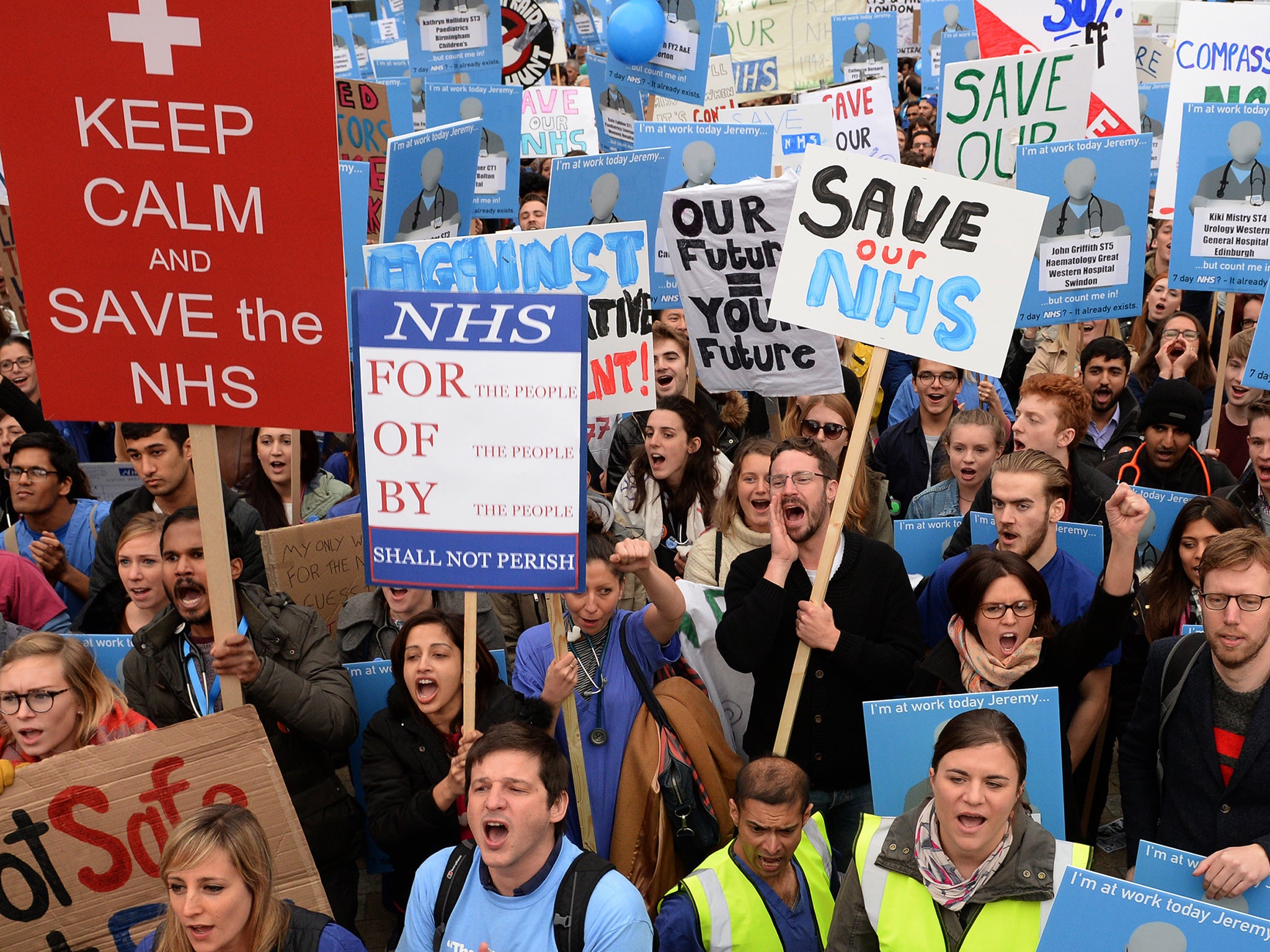This cruelly timed junior doctors' strike could risk losing the public's sympathy
Doctors risk losing trust at a time when public scepticism has grown in so many other areas. And patients risk losing lives, especially if threats to withdraw emergency cover for the first time are enacted


There is one thing everyone can agree on: the last thing our nation needs right now is for thousands of doctors to down their scalpels and stethoscopes as the sickly National Health Service struggles for survival amid soaring pressures. Yet barring a last-minute breakthrough, the British Medical Association (BMA) is expected to announce this week that junior doctors will carry out their threat to strike for the first time in four decades.
This dispute over weekend working has the potential to become a landmark political struggle leaving deep scars on protagonists and patients alike. The Tories risk losing support by fighting on their most vulnerable front – voters remain suspicious over their commitment to the country’s most precious public service. Doctors risk losing trust at a time when public scepticism has grown in so many other areas. And patients risk losing lives, especially if threats to withdraw emergency cover for the first time are enacted.
The row highlights how the most bolshie unions now seem to be ones fighting to protect middle-class pay and privileges in the public sector. The last time the BMA sought to exploit the sanctification of the NHS and widespread sympathy for doctors with industrial action was over pension changes four years ago, only to find the public unmoved. This is unsurprising: the deals are so lucrative that looming reductions in lifetime pension limits from £1.25m to £1m are likely to drive thousands of doctors into retiring in their mid-fifties.
Clearly there is visceral dislike for a Conservative government among medical union leaders. As they prepare for possibly the most serious strike in NHS history, they know junior doctors are rightly popular, admired for their dedication and enjoying strong public support – although this could swiftly dissipate as thousands of operations are postponed. Even the threat of a strike led to scores of cancellations before the two sides agreed to fresh talks in November.
Some advances were made during these discussions over a new contract for England’s 45,000 junior doctors (a misleading term, since it includes experienced team leaders on more than £70,000-a-year as well as those just out of medical school on £23,000 basic salary). Yet one key sticking point seems to be the government’s desire to eliminate the antiquated idea of automatic annual pay rises, regardless of talent and progress on placements.
This highlights that while both sides talk of patient safety, this is really a pay dispute with highest possible stakes. Ministers have behaved in bellicose manner; behind his emollient facade, health secretary Jeremy Hunt is one of the toughest negotiators in Westminster as befits someone who built a multi-million pound business. But the BMA has behaved like an old-fashioned trade union, persistently moving the goal posts and making spurious claims to dodge the central issue.
Given compelling evidence of higher death rates at weekends, the government had a duty to improve medical coverage while keeping costs down. It wants higher basic pay with reduced overtime rates, plus lower limits on maximum hours and consecutive night shifts. NHS medical director Sir Bruce Keogh, a respected cardiologist, says there is a ‘moral and professional case for concerted action’ to tackle ‘an avoidable weekend effect’. But the BMA - an organisation with a history of resisting reforms to empower patients – responded by spinning that such moves damage patient safety.
As the former editor of The British Medical Journal Richard Smith says, doctors are ‘smart enough to realise that the public are much more likely to respond to threats to patient safety than to doctors having to work Saturday evenings.’ He also points to a strange paradox of medical strikes seen around the world: they can lead to lower mortality rates - although only because so much elective surgery is cancelled, which although non-emergency still leads to fatalities in many cases.
Despite some mistakes, Hunt deserves credit for focusing on safety since taking on the brief after the coalition’s botched reforms. Patient care is core to any health service, but his predecessors were too dazzled by doctors to focus properly. The NHS relied on public adoration to mask grave deficiencies, resulting in a series of scandals and comparatively poor outcomes in key areas from cancer survival to under-five mortality rates. Now this strike threat is cruelly timed to hit the NHS during the winter period when it comes under worst pressures, undermining hollow talk that interests of patients are always paramount.
Yet while the dispute revolves around pay, it is symptomatic of deeper issues. Smith wrote also about doctors feeling like stressed cogs in vast machines, anxious over the future and upset by ministers dismissing their concerns. This explains anecdotal evidence of medics fleeing abroad, leaving the NHS propped up by immigrants. Health budgets are ring-fenced but still inadequate in face of rising demands from a rapidly-aging and fattening population alongside sharp, poorly-executed cuts to social care; this spirals into further failures across the system.
Britain needs to wake up to reality: our stumbling health service is far from the envy of the world. Just four years after it was ludicrously lauded in the London Olympics, the NHS struggles to survive under pressure of conflicting demands from patients, pen pushers, politicians, staff and voters. Yes, it needs to be at full strength throughout the week. But it also needs more medics, improved facilities, better management and smarter technology to cure its many ills. So who will pay for all this?
Join our commenting forum
Join thought-provoking conversations, follow other Independent readers and see their replies
Comments
Bookmark popover
Removed from bookmarks